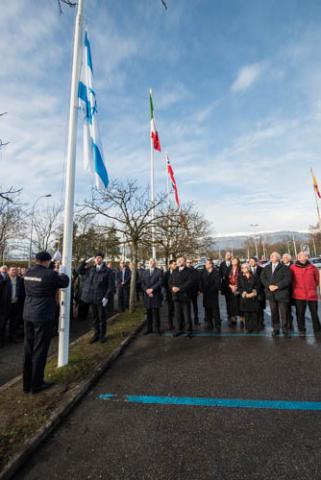Update 15 January 2014
At a ceremony today at CERN, the Israeli flag was hoisted for the first time to join the other 20 flags of the organization’s Member States, after UNESCO officially recorded Israel's accession as a new CERN Member State.
Following the ceremony, Mr Avigdor Liberman, Deputy Prime Minister and Minister of Foreign Affairs of the State of Israel, visited the LHC tunnel and the ATLAS experiment, accompanied by a delegation of officials and representatives of the Israeli scientific community.
"In my visit in CERN today, I have witnessed the frontiers of science. I have realized the scope of collaboration between Israel and CERN. Israeli scientists and their CERN colleagues share a dedication to scientific excellence, technological development and education. Israel and CERN share ideals and goals and therefore have a wide prospect for cooperation," said Mr Avigdor Liberman.
"I am very honoured as Director-General to welcome Israel as a new Member State. CERN and Israel have already a long history of mutual collaboration, and this day will undoubtedly be memorable, promising increasingly fruitful scientific cooperation between CERN and the Israeli physics community," said CERN’s Director-General Rolf Heuer.
Original press release
Geneva, 12 December 2013. Following a resolution unanimously adopted at today’s 169th session of the CERN1 Council, CERN is set to admit Israel as the Organization’s 21st Member State. Israeli Membership will be effective from the date on which Israel formally notifies UNESCO that it has ratified the CERN Convention. CERN was established under the auspices of UNESCO, and UNESCO remains the depository of the CERN Convention. Israeli scientists have been involved in the CERN programme since 1991, and Israel has been an Associate Member of CERN since 2011.
“The Israeli scientific community has brought a great deal to CERN over the years,” said CERN Director General Rolf Heuer. “I am looking forward to welcoming Israel as our 21st Member State and to intensifying our collaboration.”
“Israel is proud to become a full member of CERN, a flagship of European scientific research,” said Eviatar Manor, Israel’s Ambassador to the UN in Geneva. “We look forward to contributing to the further development of our relationship for the benefit of science, development and education."
“As a member of the fact-finding mission that assessed Israel’s readiness for CERN Membership, I was extremely impressed with the quality of Israeli research and researchers,” said CERN Research Director Sergio Bertolucci.
“This is a very special moment for Israeli Science and Israel,” said Eliezer Rabinovici, Chair of the Israeli Academy of Science’s National Committee for High Energy Physics and Professor at the Hebrew University in Jerusalem. “It reflects decades in which many Israeli scientists, technicians and Israeli industry have contributed significantly to the European scientific effort at CERN. It also has a sense of return. We are becoming full members of the crew at a most exciting period in which CERN is about to scan new horizons.”
Israel’s formal association with CERN began in 1991, when the country was granted Observer status by Council in recognition of the major involvement of Israeli institutions in the OPAL experiment, accompanied by contributions to the running of the LEP accelerator. Today, Israel is involved with the ATLAS experiment at the LHC, as well as the ALPHA and COMPASS experiments, and experiments at CERN’s ISOLDE facility. Israel contributes to the LHC and CLIC accelerators, and operates a tier-2 centre of the Worldwide LHC Computing Grid. Israel also supports the involvement of Palestinian students at CERN.
Israel’s forthcoming membership of CERN follows a decision taken by Council in 2010 to enlarge CERN’s Membership. At the same time, Council established the status of Associate Membership for countries wishing to have a limited participation in the CERN programme accompanied by limited benefits of Membership. All new applicants for full Membership must pass through a period of at least two years as an Associate Member before Council takes a decision on full Membership. Countries may also apply for Associate Membership in its own right.
Following this decision, Israel became CERN’s first Associate Member in 2011, and was followed by Serbia in 2012. Cyprus and Ukraine will become Associate Members as soon as their national parliaments ratify the accession agreement. Discussions are still underway with Slovenia regarding Membership, and with Brazil, Pakistan, Russia and Turkey, all of which have applied for Associate Membership. Romania has the status of Candidate for Accession, having applied for full Membership before the new procedures came into effect.
1. CERN, the European Organization for Nuclear Research, is the world's leading laboratory for particle physics. Its headquarters are in Geneva. Its Member States are currently: Austria, Belgium, Bulgaria, Czech Republic, Denmark, Finland, France, Germany, Greece, Hungary, Israel, Italy, Netherlands, Norway, Poland, Portugal, Slovakia, Spain, Sweden, Switzerland and the United Kingdom. Romania has the status of Candidate for Accession. Serbia is Associate Member State in the pre-stage to Membership. India, Japan, the Russian Federation, the United States of America, Turkey, the European Commission and UNESCO have Observer status.

